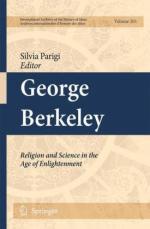|
This section contains 9,385 words (approx. 32 pages at 300 words per page) |

|
SOURCE: “Berkeley's Objection to Abstract Ideas and Unconceived Objects,” in Essays on the Philosophy of George Berkeley, edited by Ernest Sosa, D. Reidel Publishing Company, 1987, pp. 61-81.
In the following essay, Bolton provides support and opposition for Berkeley's rejection of abstraction as well as his form of idealism.
1. According to Berkeley's famous theory of perception, we see, feel and otherwise perceive nothing but ideas; the whole of the sensible world with its trees and rocks, sun and stars, consists of nothing but idea sequences. The oddity of the consequence, that we eat, drink and clothe ourselves in ideas, seems to have discredited this theory for the first two hundred years. But in this century, the theory has been applauded for its elegant economy and the daring way it cuts off speculation about the existence and nature of the sensible world. Many other early modern philosophers regarded sensory ideas...
|
This section contains 9,385 words (approx. 32 pages at 300 words per page) |

|


